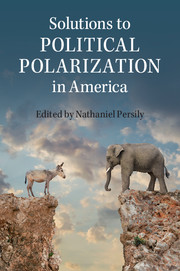Book contents
- Frontmatter
- Dedication
- Contents
- Contributors
- Introductory Chapters
- Reforming the Electoral System
- Strengthening Parties
- 8 Stronger Parties as a Solution to Polarization
- 9 Reducing Polarization by Making Parties Stronger
- 10 Focus on Political Fragmentation, Not Polarization: Re-Empower Party Leadership
- 11 Two Approaches to Lessening the Effects of Partisanship
- Empowering and Informing Moderate Voters
- Lowering Barriers to Policy Making
- Index
- References
10 - Focus on Political Fragmentation, Not Polarization: Re-Empower Party Leadership
from Strengthening Parties
Published online by Cambridge University Press: 05 May 2015
- Frontmatter
- Dedication
- Contents
- Contributors
- Introductory Chapters
- Reforming the Electoral System
- Strengthening Parties
- 8 Stronger Parties as a Solution to Polarization
- 9 Reducing Polarization by Making Parties Stronger
- 10 Focus on Political Fragmentation, Not Polarization: Re-Empower Party Leadership
- 11 Two Approaches to Lessening the Effects of Partisanship
- Empowering and Informing Moderate Voters
- Lowering Barriers to Policy Making
- Index
- References
Summary
Political polarization, from my point of view, is a concern primarily insofar as it affects the capacity for governance – others might be troubled with a political culture characterized by divisiveness, lack of civil disagreement, and the like, but my concern is effective governance. Indeed, polarization might well involve tragic conflicts between the domains of voting and governance; as responsible party government advocates have long argued, coherent and sharply differentiated political parties appear to increase turnout, make the most salient cue in voting – the political party label – that much more meaningful, and through that cue enable voters to hold officeholders more meaningfully accountable. Thus, party polarization has electoral benefits; it is not a matter of all cost and no advantage. As a result, we should view partisan polarization as a significant problem only if and when its costs are substantial enough to outweigh these other benefits. To the extent partisan polarization contributes significantly to political paralysis and governmental dysfunction, then polarization shifts to becoming a major problem for American democracy.
But if the concern about polarization is best understood as one about effective governance, the angle into this problem that is worth focusing on now and in coming years needs to be redefined. My argument is that we should identify the issue not as political polarization but as one of political fragmentation. By fragmentation, I mean the external diffusion of political power away from the political parties as a whole and the internal diffusion of power away from the party leadership to individual party members and officeholders.
Until recently, much of the commentary on polarization has focused on the difficulty of fitting America's increasingly parliamentary-like political parties into the Constitution's institutional architecture of a separated-powers system (Levinson and Pildes 2006). In times of divided government (but not only then, given the Senate filibuster rule, which remains in place on policy matters), will the absence of a “majority government” make it too difficult to generate the kind of concerted political action required for legislation? But beneath the surface fact of party polarization lies a more specific set of questions essential to getting at the capacity for effective governance.
- Type
- Chapter
- Information
- Solutions to Political Polarization in America , pp. 146 - 156Publisher: Cambridge University PressPrint publication year: 2015
References
- 5
- Cited by

